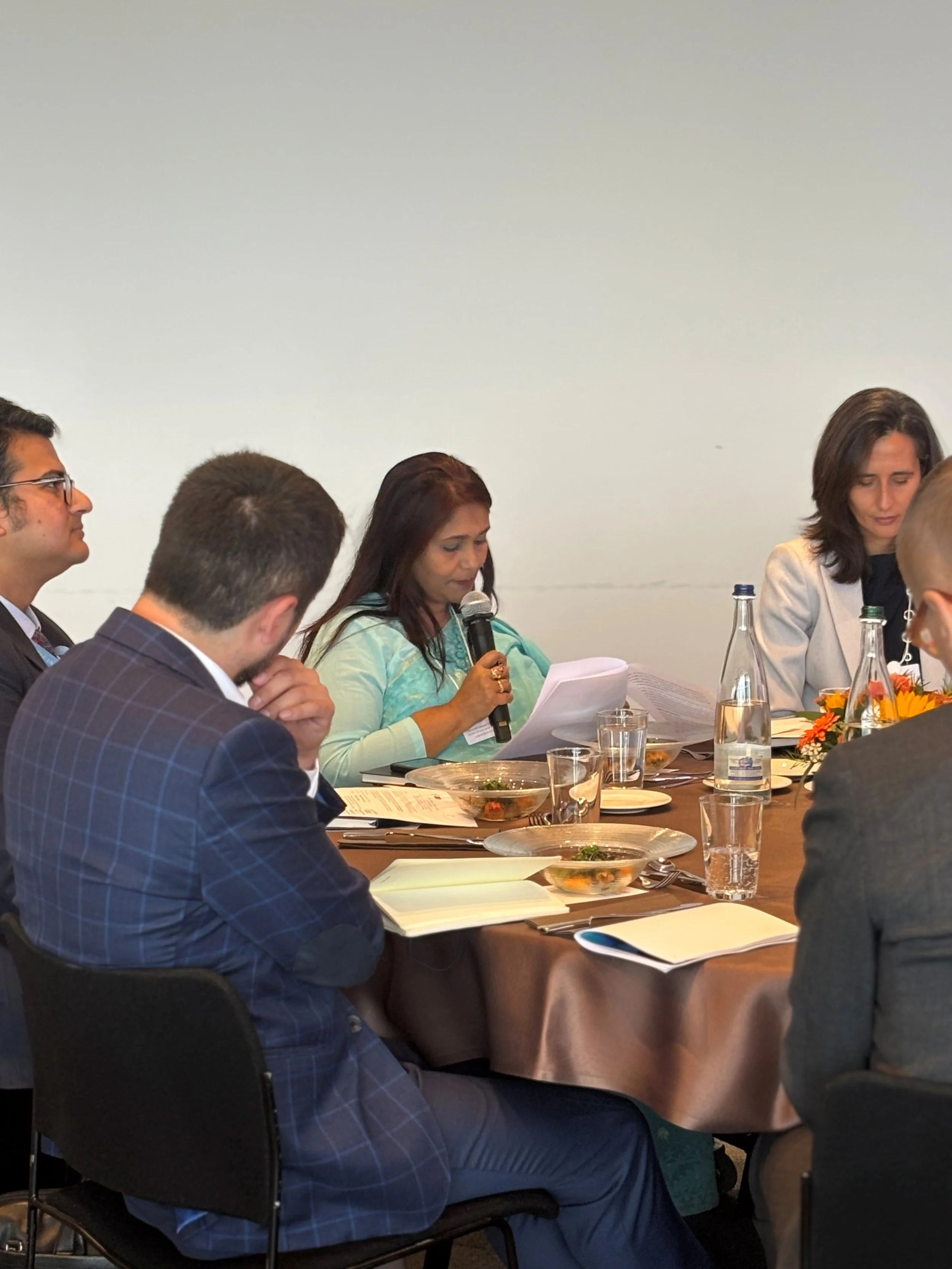Aligning Trade & Labour: A Country Perspective from Bangladesh
During the Geneva Dialogue on Trade and Labor (October 2025), hosted by the TASC Platform and the World Economic Forum Trade and Investment Team, H.E. Ambassador Ms. Nahida Sobhan, Permanent Representative of Bangladesh to the UN and other International Organizations in Geneva, shared how Bangladesh’s own experience makes the case for formalising the trade and labour nexus through forward-looking policy reforms in which economic integration goes hand in hand with social inclusion.
The Geneva Dialogue on Trade and Labour forms part of the broader Trade and Labour Programme, a joint initiative of the TASC Platform and the World Economic Foundation, supported by the Laudes Foundation.
It is nothing new to say that global trade is an important component of global economy. But we often tend to disregard that labour forms a crucial and integral part of systemically important supply chains in global trade. At a time of profound global transition, the nexus between trade and labour can no longer be a peripheral discussion, as its implications reach far beyond markets and shape the lives of workers in every country.
And when we do bring this component to the table, issues like labour exploitation and poor standards pop-up as significant concerns. Many countries, particularly the importing countries, are increasingly putting in place national legislations and private compliance initiatives, to live up to expectations in the labour and environmental areas. At a global level, responsible business conduct and corporate social responsibility frameworks are placed.
“On the other hand, geo-economic fragmentation is just adding fire to the already existing vulnerabilities of global trade and labor. It is like a domino effect. Geo-economic fragmentation hinders trade, hindering growth, disrupting the health of supply chain and certainly affects producers and labour.”
While we chart our courses through this difficult and challenging time, it demands the merit of our collective efforts to ensure that trade policies remain consistent with international commitments, transparent in intention, and fair in their implementation, particularly for countries still integrating into global markets. In this evolving context:
“Workers must remain at the centre of the global value chain. Trade policy must therefore uphold a simple but essential principle: economic integration must go hand in hand with social inclusion. ”
It requires companies to take responsibility for their supply chains and ensure that trade benefits everyone involved including the labour. We can not overlook the factors that are essential for creating the enabling platform to ensure that the challenging issues are effectively addressed.
Bangladesh and the trade & labour nexus
Bangladesh’s experience demonstrates both the potential of trade as an engine of development and the importance of international cooperation to ensure its sustainability. Over the past four decades, trade-led growth has transformed our economy and enabled significant progress in human development. Its export sectors, particularly the ready-made garment industry, have provided employment to over four million workers, the majority of them being women. This has contributed to social inclusion, poverty reduction, and women’s empowerment. We also take great pride in being home to over 268 LEED-certified green factories, the highest number globally, which demonstrates our commitment to sustainable and ethical production. As Bangladesh graduates from Least Developed Country (LDC) status in 2026, we remain committed to deeper integration into global value chains.
At the same time, we are conscious that sustainable trade must be anchored in responsible labour practices. Bangladesh has therefore undertaken continuous reforms to enhance workplace safety, labour rights, and compliance capacity. As a demonstration of our commitment of turning words into action, last week Bangladesh has amended the Labour Act of Bangladesh. Furthermore, our government has also ratified three more ILO conventions at the same time.
We underscore that such commitment, must be met with an open and fair trade that can truly become a global public good and ensure inclusive growth and development in the developing countries like Bangladesh.
Towards a Fairer Trade–Labour System: Three Priorities for Action
To support meaningful progress on SDG 8 and SDG 17A, three core priorities offer entry points where cooperation can translate ambition into implementation.
First: efforts to integrate labour considerations into trade policy should promote progress rather than penalize developing economies. Hence, implementing Fair trade, Cooperation, technical assistance, and capacity-building should accompany expectations on labour standards. We can not shy away from what we have already committed to – SDG 17.
Second: both digitalisation and decarbonisation must include support for reskilling, technology transfer, and social protection. A fair and just transition is essential to ensure that economic and environmental transformation is both sustainable and socially beneficial.
Third: enhanced collaboration between the two institutions, WTO and ILO is essential to ensure that trade rules advance social outcomes and responsible global supply chains, while safeguarding the development space of developing countries and preventing unintended barriers to their participation in global trade.
Bangladesh is committed to advancing a cooperative global approach in which the global trading system and international labour standards work in synergy and in all fairness, so that trade remains a driver of opportunity, development and decent work for all, especially for developing countries.
The Trade and Labour Programme convenes stakeholders across trade and labour research, policy and practice to examine how economic transitions can deliver more just and inclusive outcomes. Through fieldwork, multistakeholder dialogue, and policy engagement, the programme is building momentum for a global trade system that is socially responsive, economically resilient, and fit for the future of work, and the future of working together.
📬 Interested in joining this dialogue? Get in touch with us.




